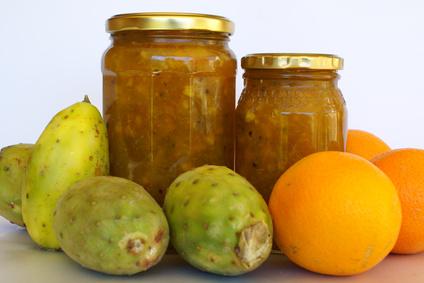What Are the Benefits of Aloe Vera & Prickly Pear?
Prickly pear cactus may help maintain healthy blood sugar levels.
Aloe vera, a member of the lily family and native to North Africa, has been used for medicinal and practical benefits for more than 4,000 years. Aloe vera is generally used as a supplement, though some people regularly include aloe in their diets as a functional food, one that improves health beyond its basic nutritional value. Prickly pear, a species of cactus native to the Western hemisphere, has been used as a food and traditional medicine, particularly in Mexico. Also called nopal, prickly pear can be eaten as a fresh fruit, mashed into a sauce or cooked into a syrup or jelly. While each offers distinct benefits, some of the uses of these two plants may overlap or complement each other. Consult your doctor before using these or other herbal supplements to treat a medical condition.

Aloe Vera Blood Sugar and Cholesterol Benefits
A study published in the October 2012 issue of the journal "Metabolic Syndrome and Related Disorders" found that supplementation with aloe vera inner leaf gel for eight weeks significantly reduced levels of blood sugar and low-density lipoprotein, or LDL "bad" cholesterol, in participants with metabolic syndrome. Metabolic syndrome is a condition distinguished by a cluster of risk factors that predispose an individual to developing heart disease and diabetes. Levels of hemoglobin A1c -- a test that measures average blood sugar levels for the last two to three months by determining the amount of glucose that has become attached to red blood cells -- also were significantly reduced.
Prickly Pear Blood Sugar Benefits
Mucilage, a complex carbohydrate, and fiber in prickly pear cactus help maintain healthy blood sugar levels by slowing the absorption of glucose from the intestinal tract, according to the University of Texas at El Paso. Researchers of a study published in the June 2011 issue of the journal "Phytomedicine" found that prickly pear may keep blood sugar levels in check by preventing damage to the liver, which helps process fats and sugars. The laboratory animal study also observed that prickly pear helped maintain insulin sensitivity in cells throughout the body.
Prickly Pear Cardiovascular Effects
Prickly pear may reduce cholesterol levels, according to a study that appeared in the September 2012 issue of the journal "Food Chemistry." In the study on laboratory animals, prickly pear polysaccharides increased levels of high-density lipoprotein, or HDL, the good form of cholesterol. Prickly pear also increased activity of an enzyme that contributes to the production of HDL cholesterol. Additionally, the cactus extract decreased levels of oxidized lipids, which promote arterial plaque formation, and inhibited inflammation. Researchers concluded that prickly pear shows promise as a natural cholesterol-lowering supplement. Further studies are needed to determine whether these benefits extend to humans.
Aloe Vera and the Immune System
Aloe vera offers immune-stimulating and potential cancer-preventive benefits, according to nutritionist Phyllis Balch, author of the book "Prescription for Herbal Healing." Aloe potentially works by inhibiting tumor growth and by decreasing its blood supply. A tissue culture study published in the 2012 issue of the journal "Pharmacology" found that an aloe extract inhibited colon cancer cell growth and promoted early cancer cell death.
الاخبار الجديدة
- RITA Visit GulFood 2015 - 25/07/2015 07:17
- Rita Food & Drink visit WINTER FANCY FOOD SHOW - 25/07/2015 07:13
- Gallery RITA Visit Thaifex - World of food ASIA 2015 - 25/07/2015 07:09
- RITA Food & Drink - VISITS THAIFEX – World of food ASIA 2015 - 25/07/2015 06:57
- The Using of Basil Seed Drink - 03/06/2015 08:16

